(单词翻译:单击)
Depending on your personal view, ancient Rome was responsible for giving the modern world a number of traditions, including various legal ideas, democracy, and some of our religious celebrations. However, there are still many ancient Roman traditions that are slightly obscure, mostly relegated to the dustbin of history. Here are some lesser known ones.
从您个人的角度来看,古罗马负责给现代世界留下许多传统,其中包括各种法律观念,民主主义以及一些宗教庆典。然而,仍旧有许多古罗马的传统略显晦涩,这些大多都被扔进了历史的垃圾堆里。这里就有一些鲜为人知的。
10、Mos Maiorum
祖先之法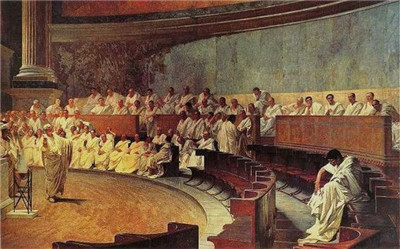
The mos maiorum was an unwritten code pertaining to behavioral customs mostly derived from the traditions of the Romans’ ancestors. Much like the Jews in the first song in Fiddler on the Roof, the Romans loved tradition and felt that moral decay would occur if they strayed too far from the ideals of the past. Therefore, obedience to the mos maiorum was seen as tantamount to maintaining a proper civilized Rome and was almost given legal standing.
祖先之法是一条关于行为习俗的不成文的法则,大体上源自于罗马人祖先的传统。就像犹太人在《屋顶上的小提琴手》中所唱的开篇序曲那样,罗马人热爱传统并且认为如果太过于偏离过去的思想,那将会导致道德的沦丧。因此,遵循祖先之法被视为无异于维持罗马文明的一种方式,甚至几乎拥有法律地位。
There were occasions where breaking tradition was seen as subversive; in the case of legislation, it was considered customary to bring proposals before the Senate. Any magistrate who neglected to perform this duty ran the risk of being labeled a traitor. Even with the strict punishment handed down for certain offenses, it was still considered unwritten. As such, the transmission of the mos maiorum from one generation to the next was said to be the duty of the family, especially the paterfamilias (head of the household).
有一些打破传统的场合被视作是颠覆性的;在法律上,被认作是参议院提案的惯例。任何忽略履行这项职责的法官,都冒着被当作是叛徒的风险。即便对于某些罪行有严厉的惩罚手段,但这仍旧被看作是不成文的规定。因此,祖先之法的代代相传被当做是家庭的责任,尤其是家长(即户主)的责任。
9、Ludi
竞技庆典
The ludi were public games that were normally held in conjunction with religious festivals, though there were occasional events which were secular in nature. Many of them were annual events, especially the religious ones, andthe most famous was the Ludi Romani, which honored Jupiter and was held each September. (It’s the oldest of the ludi and was the only one held in Rome for 300 years after it first began.)
虽然竞技庆典中偶尔也存在一些世俗性的节目,但通常都是在宗教节日的时候举行的公开竞技。其中许多都是一年一度的项目,尤其是那些与宗教相关的,在那之中最有名的就是“罗马节”了,这是为了表达对朱庇特(罗马神话中的宙斯大帝)的尊敬而在每年九月举行的盛典。(这是竞技庆典中最古老的节目,同时也是唯一一项在初次创立之后,时隔300年又在罗马举行的节目。)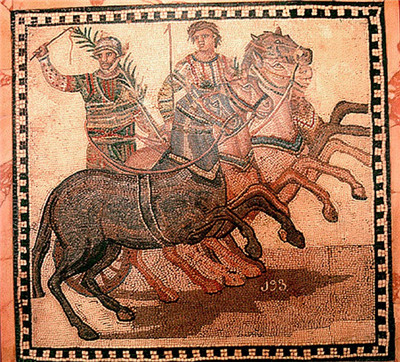
Ludi normally consisted of chariot races, as well as animal hunts. Later editions incorporated gladiatorial combat and there were even special ludi, which were strictly theatrical performances. The ludi with the largest gap in celebration was probably the Ludi Saeculares, or Secular Games. Held in honor of a saeculum, or the longest estimated human lifespan, the Ludi Saeculares were held once every 110 years. (Historian Zosimus actually blames the fall of the Roman Empire on the Romans neglecting to honor this ancient festival.)
竞技庆典一般来说包括战车竞技和动物狩猎。再后来也加入了角斗甚至是一些特殊的竞技项目,那些节目完全属于戏剧性的表演。竞技庆典与普通的庆祝活动最大的不同可能在于罗马百年祭,也称为百年大祭。为了纪念一个百年,或者是估计的人类最长的寿命,罗马百年祭每110年举行一次。(实际上历史学家佐西穆斯将罗马帝国的衰落归咎为罗马人忽视了对这个古老的节日的纪念。)
8、Dies Lustricus
净化日
Just as it is in our society today, the birth of a new child was seen as a joyous event, one which brought with it a number of interesting traditions. The dies lustricus, or “day of purification,” was an eight- or nine-day period after birth, which carried with it special meaning for the newborn. Healthcare and technology being what they were back then, a large percentage of childrendidn’t make it past one week, and the Romans felt that a child wasn’t officially a part of the family until the dies lustricus had passed
正如如今的社会习惯,人们普遍认为婴儿出生是一件令人欢快的的大事,因此随之而来的有些有趣的传统习俗就这样逐渐形成了。易招致死亡的日期或者说净化日是指出生后八九天这段时期,他们认为这几天对新生的婴儿是非常重要的。当时的医疗保健技术水平比较落后,大多数的婴儿都活不过一周,所以罗马人普遍认为只有这个孩子经历了净化日这段时期后才能真正的将他们视为家人。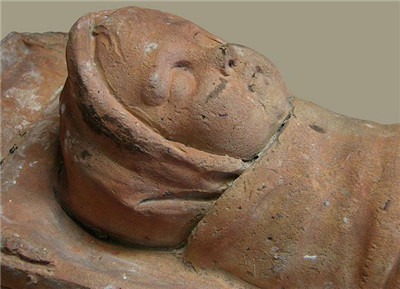
Various rites were performed leading up the final day, including the laying of the baby on the ground and its subsequent raising to the sky by the father. (This was supposed to signify the father’s recognition of the child as one of his own.) At the conclusion of the dies lustricus, a baby was officially given a name, which is why babies who died early were left nameless. A special amulet—bulla for boys and lunula for girls—was also given to them during this period and it was meant to protect them from evil forces
净化日的最后一天前各种仪式上演着,包括把婴儿放在地面上然后孩子的父亲把孩子高举向天空。(据猜测这个习俗可能是检测婴儿的父亲是否认同这个婴儿是自己的。)在净化日结束时,这个婴儿才会被正式的赐予名字,这就解释了为什么早夭的婴儿是没有名字的。同时在仪式期间他们还被赐予了特殊的护身符——男孩儿的布拉式垂饰,女孩儿的新月形吊饰,这些护身符能够保护他们免受恶魔的侵害。
7、Patria Potestas
父权主义
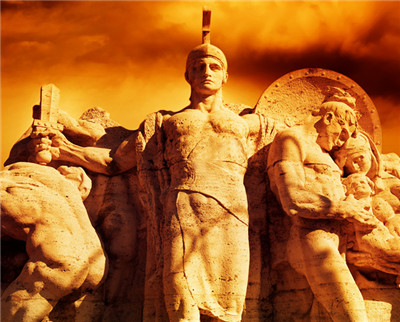
Warrior with a sword statue on the Vittorio Emanuel bridge (Rome Patria potestas, or “paternal power,” was one of the most prevalent traditions in ancient Rome. It greatly influenced the law of the time, as well asaffecting our laws today. The power of a father over his children was seen as the highest of the land, with the children unable to go against their father’s wishes. Social convention usually kept abuses of power from becoming too widespread, though it was still up to the father as to what he wanted to do, especially in regard to punishment. In addition, the father also had dominion over any of his grandchildren, or even his great-grandchildren. Although, in reality, many children were freed from patria potestas by the time they were in their mid-twenties, since the previous generation was normally dead already. One of the oldest traditions,patria potestas was said to have been granted by Romulus, and even gave a father control over his children’s possessions, which remained his until he died.
父权主义,或是“父权力量”,是古罗马最普遍的一个传统。它很大程度上影响了当时以及现在的法律制度。父亲临于孩子的权势被看做是古罗马最重要的部分,孩子们不能违背父亲的意愿。社会惯例总是防止权力滥用,尽管它仍然取决于父亲的意愿,特别是在惩罚这一方面。除此之外,父亲在任何孙子甚至曾孙子面前,都有着绝对的统治权。然而,实际上,由于上一代的死亡,很多孩子在25岁左右就从父权主义中解放出来。作为一个最古老的传统,父权主义在罗穆卢斯(罗马神话中的一个形象)的故事中已被视为理所当然,甚至给了一个父亲控制自己孩子财产的权利,直到父亲死亡。
6、Concubinage
纳妾制度
A concubine in ancient Rome was slightly different from that of the traditional variety. First off, a man could only have one concubine at a time, and was not allowed to have a concubine if he was already married. In addition, the relationship between a man and his concubine had legal standing and was considered a step below marriage, though there werespecific legal differences.
古罗马的妾侍跟传统的妾侍有一点细微的差别。首先,一个男人只能有一个妾侍,但是如果他已经结婚了的话,那么他就不准再拥有妾侍了。除此之外,男人和妾侍这种关系是受法律承认的,而且人们普遍认为这是婚姻的某一步骤,但是在法律方面还是截然不同的区别。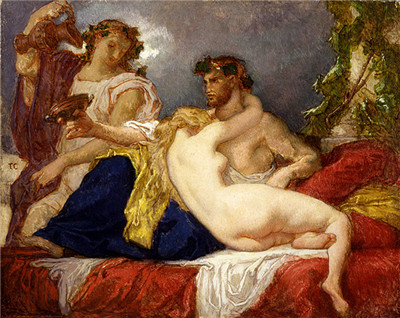
In fact, most women who became concubines were only not wives due to social standing, or a man’s wish not to complicate the inheritance of his wealth due to a previous marriage. Children born from concubinage were considered illegitimate; however, the father was still expected to provide for them while he was alive. Also, the concubine herself was not elevated to the same social status as the man—as opposed to a wife—and she was banned from worshiping Juno, the goddess of marriage.
事实上,大部分成为妾侍的妇女不能成为妻子,不仅仅是因为社会地位,归根结底还因为男人不想要先前的这段婚姻来混淆他们子孙的继承财产的权利。妾侍生下的孩子是不被法律承认的;然而,法律依旧希望父亲要在孩子活着的时候抚养他。同时,妾侍自身不会提升到与男人拥有同等社会地位的妻位上,她将不再受到婚姻女神朱诺的保护。
5、Peregrini
自由民
Peregrini were people who were not citizens of Rome and the concept of theperegrini was vital to the success of the Roman Empire. Civil law, such as the ownership of property, was restricted in a lot of ways, but the harshest penalty for being a peregrini was that they were unable to marry a Roman citizen, unless extraordinary circumstances allowed for it. The Romans did, however, allow peregrini to retain the rights of their homeland. For example, Athenians were allowed to marry Athenians and be heirs to other Athenians.
自由民并不是真正的罗马公民。自由民概念的提出也是罗马帝国成功的关键。在法律上,自由民在许多方面受限,比如财产权。但是,最残酷的地方还是在于他们不被允许与罗马公民通婚,除非他们作出十分卓越的贡献才可以。然而,罗马人曾向自由人承诺保留他们的家园,比如,雅典人之间可以通婚,也可以成为其他雅典人的继承人。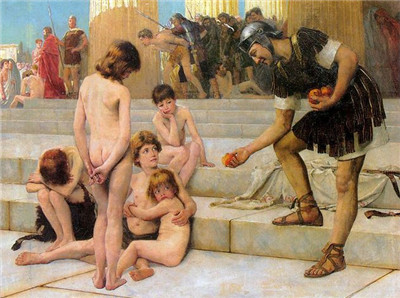
Over time, the rights of Roman citizens began to take over the day-to-day interactions between Romans and non-Romans, so much so that peregriniwere almost second-class citizens, barely better than a slave. However, this was all made moot in A.D. 212, when Emperor Caracalla declared all free men to be citizens of Rome, regardless of their place of birth.
随着时间的推移,对罗马公民权的重视开始逐渐取代了罗马人与非罗马人的日常交流,以至于后来自由民几乎成为了二等公民,仅仅好于奴隶。然而,在公元212年,罗马皇帝卡拉卡拉宣布所有的没有束缚的人,无论他们出生在何方,都是罗马的公民。这在当时引发了争论。
4、Poena Cullei
(溺毙)
The Romans had laws for everything, many of which have been adopted by Western civilization into their own judicial systems. However, capital punishment was quite prevalent in ancient Rome, being used for a number of crimes that we would simply jail someone for today. Poena cullei was a special type of capital punishment, one which was reserved for a particular crime: parricide, or murder of a member of one’s family.
罗马有很多法规,现在有一部分曾被西方司法系统所采用。然而,死罚在过罗马非常流行,被应用在很多我们现在在最多判个监禁的犯罪上。溺毙(沉水刑)是一种非常特殊的死刑,专门惩罚一些特殊的犯罪,如:杀害双亲罪、活着谋杀亲属罪。
Once convicted, the murderer would have his face covered with a wolf’s skinand sandals were placed on his feet (presumably to keep him from defiling the air or the ground). He would now wait in prison until a sack was made for him. Once it was ready, a dog, monkey, snake, and rooster were placed in the sack, along with the murderer, and the sack was thrown into a river or the ocean.
一旦定罪,人们就会用狼皮把凶手的脸蒙起来,然后在他的脚上穿上凉鞋(据说这样可以不让罪犯亵渎徒土地或者空气)。他将呆在监牢里,直到人们用麻袋把他装起来。但这些准备工作做好了后,人们还会在麻袋里放一只狗,一只猴子,一条蛇和一只公鸡,然后把装着罪犯的麻袋扔进河里活着海里。
3、Homo Sacer
(被诅咒的人)
Another traditional Roman punishment, the status of homo sacer was given to those who broke oaths. Homo sacer translates best as “man who is set apart.” Those punished with this title were not allowed to be ritually sacrificed, but they could be killed by anyone, with impunity. Some people were deemed homo sacer by a group of vigilantes, without any actual legal standing. (It is believed this may have occurred in early Rome, since they lacked the standing forces necessary to enforce the law, allowing people to take matters into their own hands on occasion.)
另一项传统罗马式惩罚,把背叛誓言者裁定为“被诅咒的人”。“被诅咒的人”最适合翻译成“被隔离的人”。得到这个称号的人不允许被祭祀,而他们却可以被任何人免于刑罚地杀死。有些人,不经过任何实质法律程序,就可以被一个治安委员会裁定为“被诅咒的人”。(一般认为这种现象可能发生在早期罗马,因为当时他们缺乏足够人力执行法律,所以允许人们视情况自己决定争端。)

In addition, any legal rights the convicted would have normally had, such as land ownership, were revoked, essentially ridding him of what made him a part of society. The Law of the Twelve Tables, the foundation of Roman law, specifically mentions homo sacer, making it the punishment for patrons who deceive their clients.
另外,被判此刑者被剥夺任何正常法律权利,例如土地所有权,实质上剥夺了他作为社会一份子的基础。十二铜表法,作为罗马法的根基,特别提到了“被诅咒的人”,使之成为对赞助人欺骗客户的惩罚。
2、Triumph
凯旋庆典
In ancient Rome, a triumph was an extraordinarily special ritual, a parade saved for a victorious general, and the highest honor that could be bestowed on a military man. (Although, the rite was abused in the later years of the Republic, with the aristocracy vying to outdo each other.) Various requirements, including a kill count, were set and the entire thing had to be approved, as well as paid for, by the Senate. When the Republic fell, all triumphs went to the Emperor, as he was seen as the commander-in-chief and all military honors went to him.
在古罗马时期,庆祝胜利的仪式是一种十分特殊的典礼,是一场为得胜归来的将军进行的游行,也是授予一个军人的最高荣誉。(然而,在古罗马共和国的后期,由于贵族们相互之间的竞争,这种仪式被滥用了。)进行这种仪式必须要具备许多条件,包括杀敌数目;所有的事情必须由元老院批准、支付费用。当古罗马崩溃之后,所有的庆祝仪式都被用于皇帝个人,因为皇帝是总司令,所有的军队荣誉都归于皇帝个人。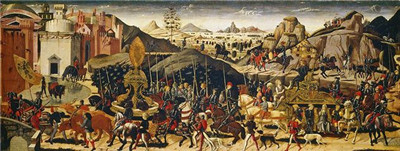
Basically, a long parade took place in Rome. Members of the Senate, musicians, sacrificial animals, and prisoners walked in front of the general, who had a gold crown held over his head by a slave. Bringing up the rear were his fellow soldiers, who traditionally sang songs poking fun at their commander; this was believed to ward off the evil eye. It culminated in the sacrifice of animals at the Temple of Jupiter, as well as the killing of the prisoners of war.
一般,在古罗马一个游行队伍都很长。队伍中元老院的成员、音乐家、用于祭祀的动物和囚犯们走在将军的前面。将军的金冠在他的头顶上方由一个奴隶拿着。殿后的是将军的士兵。按照传统这些士兵唱着歌曲来作弄他们的指挥官,人们相信这样做可以避开能伤害人的恶毒眼光(恶魔之眼)。仪式的最后,人们在朱庇特神庙里用动物进行献祭,同时杀掉战俘。
1、Damnatio Memoriae
除忆之刑
A practice common with nearly every ancient culture, and even some today,damnatio memoriae was the ritualistic and symbolic removal of a person from history. Seen as the worst punishment imaginable, worse than execution, the damned’s name was scratched from inscriptions, frescos with his face were painted over, and any statue was defaced, as if it was really him. It was normally reserved for the worst emperors in Roman history; Caligula and Nero escaped this punishment by having powerful friends, even after death.
这是一种几乎每个古老文明都有的,甚至在今天的某些地区依然存在的刑罚。除忆之刑是象征性地、通过某种仪式将某人从历史中移除,它被看作是世上最严重的惩罚,甚至比死刑还要严重。受刑的人的名字会从铭文中擦去去,壁画中的他的头像会被涂抹覆盖,而他的雕塑则会被损坏丑化,好象那才是真正的他。通常只有罗马历史上最昏庸无道的君主才会被施加这种刑罚,即使是在他们死亡以后。而卡里古拉(Caligula)和尼禄(Nero)因为有权力强大的朋友的帮助而逃过了该刑罚。
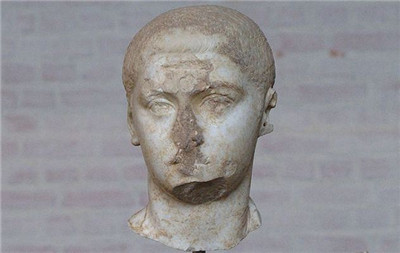
Only three emperors are known to have been officially given this punishment, including Maximian, whose friend and co-emperor Diocletian is said to have been so stricken with grief that he died shortly after hearing the news. Obviously, it didn’t work as well in practice as it did in theory; we still know about everyone who was the subject of damnatio memoriae. Some scholars feel it may have served a cathartic purpose for the public, enabling them to vent their frustration over the failures of their leaders.
目前已知的只有三位君主曾被正式地施以该刑罚,包括有马克西米安(Maximian),据说他的朋友戴克里先(Diocletian)听到这个消息以后伤心过度,不久后就死去了。很明显,这个刑罚实际并没达到它理论上的效果,因为我们仍然知晓那些受到除忆之刑的人。一些学者认为除忆之刑能起到让公众泄愤的作用,让他们发泄出对领导者的失败的失意感。


